The Revolution of Evelyn Serrano
By Marilo Nuñez (York University) / 18 September 2021
Review of The Revolution of Evelyn Serrano written and directed by Tlaloc Rivas. Presented online as part of the 2021 Edinburgh Fringe Festival, August 16-26.
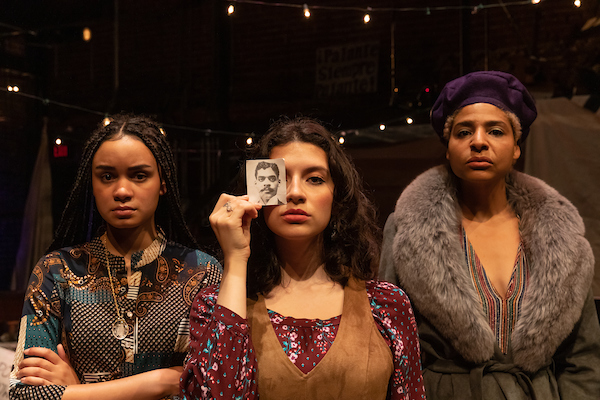
Five microphones stand centre stage as the lights come up. The set is covered in mismatched carpets and furniture. Amidst the heavy fabrics, plywood sheets have been put together to create an unadorned platform. A weathered Puerto Rican flag hangs on the back wall, suspended from the rafters above the stage. A makeshift table is set up with turntables and some records. Hand-made protest signs with slogans such as, «Palante, Siempre, Palante,» («Moving forward, always, moving forward») and «Gay Power, Black Power, Female Power, Student Power, All Power to the People!» and «Black and Puerto Rican art must be represented» litter the stage. A DJ enters and puts on a salsa record. As an MC, he introduces the audience to the characters who will be telling the story that is about to unfold; this signals the entrance into the story. A group of young students make their way out, talking, laughing, and dancing while salsa music blares on the speakers.
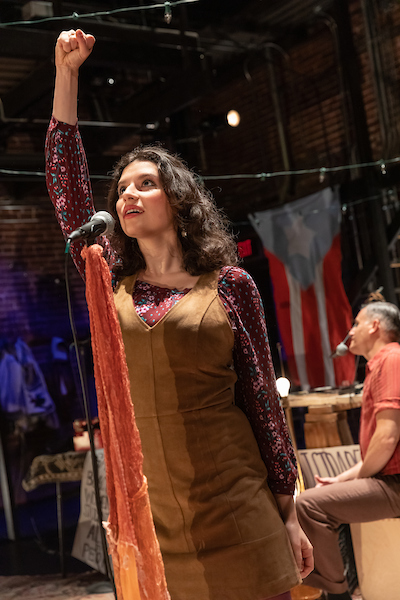
The play is inviting, even though it is not live. It is being streamed online through the Edinburgh Fringe Festival. But the storytelling format, with characters singing and speaking to each other and directly to the audience, asks us to come to sit closer to the fire. There is an urgency in their desire to share the story about the revolution that occurred on Christmas Eve in the Bronx so many years ago.
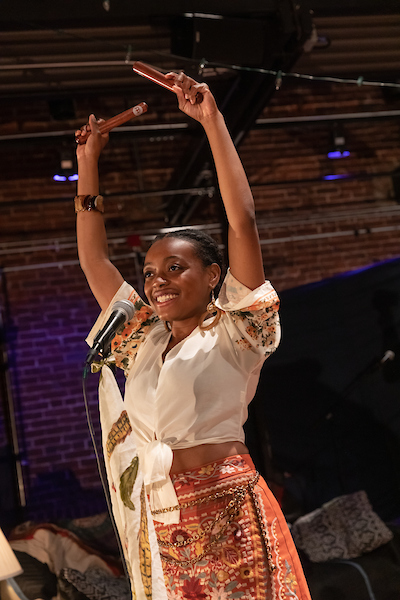
The play moves back and forth between 1979, and 1969, on the same street, in the same neighborhood, on the same day. The Revolution of Evelyn Serrano is an adaptation of the Theatre for Young Adults (TYA) novel by the same name, written by award-winning actor and writer Sonia Manzano (‘Sesame Street’). Tlaloc Rivas, the playwright, and director stated in an interview for the New Hazlet Theatre[1] that the initial adaption of the novel was much more faithful to the book, with twenty-four characters and an epic structure. In preparing for the Edinburgh production, he pared it down to the essential elements of the story. This version included seven actors playing several different characters. At first, it is not easy to see the difference between 1979 and 1969 and between who is playing whom, as transitions were made subtly through a slight lighting effect or music. The actors put on and take off coats to symbolize the change in time and character, but they stay in front of the microphones for most of the play. This is a powerful storytelling technique for this play because it forces the audience to focus on the important and relevant moments in the story. The acting is very strong and as the story progresses the action comes alive in the performer’s bodies. It becomes easy to forget that the actors are standing in front of microphones. The words, which are beautiful in their simplicity, take over and do the work they are intended to do.
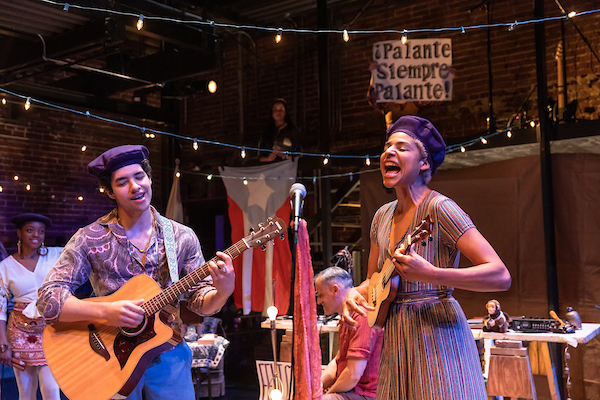
The main story is of Evelyn Serrano, a fourteen-year-old Puerto Rican girl torn between being a typical teenager in Spanish Harlem in the late sixties and the influence she feels from the changing neighborhood and her maternal grandmother. The latter arrives one day after a long absence. Evelyn’s conservative mother doesn’t seem to like shaking the boat, while her grandmother is feisty and used to belong to an activist group in her youth. It is her grandmother that opens Evelyn’s eyes to what is happening all around her. In a decisive moment, Evelyn and her grandmother (Abuela) realize they share the same values and want to fight for the people of their neighborhood. Abuela says to Evelyn, «Hold your head up high,» as the two walk forward to face the violence that is happening outside their building. «We walk out as Puertoriqueñas,» Abuela says to Evelyn, who responds with a passionate, «As a community.»
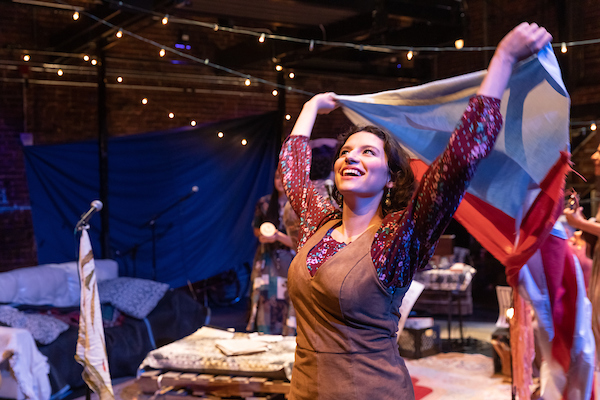
There is inequality, racism, and gentrification that is pushing Puerto Ricans out of their neighborhoods. The air around her is electric with the signs of revolution and change. A local group of young Puerto Rican activists, the Young Lords, take to the streets of New York on Christmas eve in 1969 to demand change and fight against the police brutality, discrimination and poverty surrounding them. Evelyn gets swept up in this revolution and decides to join the protests with her friends and Abuela.
We are moving forward, always, moving forward. This mantra is alive in the play’s sparse yet very emotionally charged staging. The characters need to tell the audience the story of Evelyn Serrano because it is a reminder to the community of how important December 24, 1969, was for Latinx communities and the neighborhoods they inhabited (and still inhabit) in New York. The message moves forward in time from 1969 to 1979 and reminds us in the present why community and revolution are powerful forces for positive change. The casting is diverse, with an ensemble of Afro-Latinx and Latinx characters who share the stage, reflecting the diverse makeup of the Nuyorican neighborhoods from that time.
The beauty and warmth of the people extends through the dialogue, in English and Spanish, and through the music; when the characters break out into song, it extends their passion and political commitment. Thesong Liberation Bomba, is an ensemble musical number which gets repeated throughout. The same beat and structure, which becomes a mantra to bring home the idealism and strong sense of community that these characters have. The lyrics move the story forward and reinforce the emotions the characters are feeling as they tell and relive the story. Palante, siempre, palante. «We sing for liberation, the wind lifting our voices, we shout for revolution, the moon lights our path, we pray for our protection, against the forces of hate, our children will have absolution, as we march for justice. Le lo lai lo lai, Le lo lai lo, Le lo lai lo lai, Le lo … Puerto Rico!”
It’s disheartening and palpable to know that most of the characters’ issues are fighting against- racism, discrimination, police brutality, gentrification, and poverty- are still very present today. The Revolution of Evelyn Serrano speaks to the past and the future, the generations of Latinx and Hispanic youth from the barrio who feel they have no voice. This play gives an inspiring push and impetus to stand up and speak up for not just the community it depicts but for others as well, prompting the question of how revolution can play a massive part in our everyday lives. Palante, siempre, palante!
[1] David Bernabo. An Interview with Tlaloc Rivas about “The Revolution of Evelyn Serrano.” 1 June 2021, https://newhazletttheater.org/news/preview-the-revolution-of-evelyn-serrano/.
